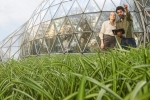
David Betge, VP of Supply Chain Design and Excellence, Bayer Crop Science
Reinhard Geissbauer, Global Digital Operations Partner, PwC Germany
Stefan Schrauf, Operations and Supply Chain Europe Partner, PwC Germany
John Cunningham, Managing Director, PwC Australia
Ben Lannan, Partner, International Trade, PwC Australia
Judith Schneider, Connected Supply Chain Senior Manager, PwC Germany
In February, while most of the world was still just following what was unfolding in Hubei province in Central China, Bayer Crop Science had already detected a disruption to their supply chain in the capital city of Wuhan. Bayer, which provides tailored agricultural solutions in seed production and crop protection, has an end-to-end global connected supply chain, which means they have a 360-degree view of their supply ecosystem.
The result?
Bayer Crop Science immediately understood that supplier delays in Wuhan in February would impact the production of finished goods in France in June, before then affecting stakeholders in Latin America in March 2021. This knowledge gave the company valuable time to alert customers, and to look at mitigation measures such as finding alternative suppliers or rerouting of material. While no organisation wants to pressure-test their systems this way, the COVID-19 pandemic demonstrated to Bayer that its end-to-end supply chains had the sort of resilience they had worked so hard to achieve with proactive Risk Management.
So, how did they do it?
Embedding resilience to deliver on customer experience
PwC has been working with Bayer Crop Science to drive the digital transformation journey and set the foundation to embed resilience into global supply chains. Bayer has a complex supply chain network, made more intricate when Bayer acquired Monsanto in 2018 and the organisation merged two supply chains into a single, integrated network.
While Bayer’s focus has been to embed resilience and flexibility into its supply ecosystem, its raison d’être has always been: customer service. For Bayer, enhanced customer experience is the organisation’s north star.
To this end, Bayer spent 2-3 years mapping out their entire global supply chain network using a digital twin. By creating a virtual replica of their supply chain, Bayer was able to model all parts of its business, running simulations to:
- identify key risks and create contingencies,
- automate data-driven decision-making,
- evaluation of new sourcing opportunities, and
- achieve greater transparency and visibility.
At the same time, Bayer uncovered efficiencies within the business, and was able to streamline the business, achieving the same level of customer service with half the number of distribution centres.
Most of all, though, Bayer recognises that supply chain resilience isn’t something you set and forget. For the organisation, it’s a constant journey towards building trust in data-driven decision making, unlocking value, enhancing customer experience, and enabling new business models.
Creating an interconnected ecosystem
A large part of Bayer’s approach has been connecting the four pillars of its supply chain – plan, source, make and deliver – to give a consistent customer experience. From demand-sensing e-commerce tools, through to 360-degree planning; the entire supply chain is geared towards being immediate, proactive, and customer-centric.
This is forward looking supported by multilevel data flow. Stakeholders throughout Bayer’s supply chain ecosystem share high-quality real-time data to upstream and downstream suppliers. Bayer enjoys connections with a whole host of external partners, including several start-ups, and together they form an innovation hub, sharing best practice and driving new solutions.
Digital mindset
Key to Bayer’s supply ecosystem is a digital mindset. Employees use digital tools to harness data analytics, especially where different elements of the supply chain have long and varying lead times. (Within the crop protection section of the business, for instance, lead times are commonly 12-18 months, whereas seed production has a lead time of 2-3 years but a window of only six weeks, once seeds are sitting in warehouses ready for distribution.)
Data analytics and AI are integral to Bayer’s supply chain strategy and management. For example, digital farming tools such as Climate FieldView cover everything from seed scripting and seed advice at the pre-planting stage, through to data capture and real-time data visualisation during planting, and then analysing yield data post-harvest to optimise decision-making, ready for the following season. It’s an interconnected process, built on experience and data capture.
Much like Bayer’s supply chain itself.
Find out more
- PwC's Digitalisation is the key to resilient supply chains
- PwC’s Connected and autonomous supply chain ecosystems 2025.
- PwC’s Know Your Vendor monitoring solution uses an analytics-based approach to perform due diligence on vendor networks to give risk visualisation tools.















